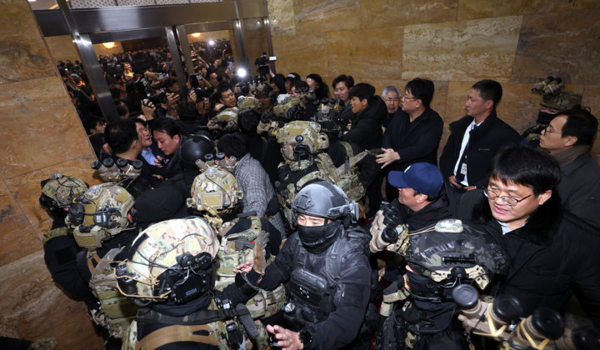
The Ministry of National Defense is pushing to identify and award military personnel who disobeyed illegal and unjust orders from superiors during the declaration of emergency martial law on December 3rd of last year. This is a groundbreaking measure to honor "disobedience"—acts of upholding military ethos by refusing unlawful directives—in a military organization where obedience to orders is considered an absolute value. This move is interpreted as an intention to redefine the principle of reward and punishment within the military, reaffirming the military's essential mission to protect the people and the constitution, rather than blindly following only superiors' orders.
The Ministry of National Defense's push for these awards is closely related to a series of events that unfolded immediately after the emergency martial law declaration last year. At that time, 1,605 armed soldiers were deployed to the National Assembly and the National Election Commission, among other places. Jo Sung-hyun, Commander of the 1st Security Group of the Capital Defense Command, who was dispatched to the National Assembly, revealed that he "received orders to drag out National Assembly members." However, Commander Jo disobeyed these unjust orders, testifying that he "judged it to be an illegitimate mission and instructed the soldiers who had entered the National Assembly to gather in an area where there were no people, and ordered subsequent units not to cross the Seogang Bridge towards the National Assembly but to wait." His actions are credited with playing a decisive role in preventing the emergency martial law troops from entering the National Assembly and attempting to arrest lawmakers at the time.
In addition, there were other righteous acts by military personnel, such as a field commander who refused orders from superiors to "forcibly suppress citizens resisting martial law troops," and an officer who prevented the approval of martial law helicopters entering Seoul three times, delaying the National Assembly's entry by over 40 minutes. Moon Hyung-bae, then acting Chief Justice of the Constitutional Court, stated, "The National Assembly was able to swiftly resolve the demand for the lifting of emergency martial law thanks to the resistance of citizens and the passive execution of duties by the military and police," suggesting that their roles contributed to the early lifting of the emergency martial law.
The Ministry of National Defense plans to actively identify, award, and encourage military personnel who, by refusing unlawful orders, contributed to maintaining public safety and order. An official from the Ministry of National Defense explained, "We will thoroughly verify the facts, and if it is determined that they contributed to protecting the lives and property of the people and upholding constitutional values, they will be awarded." They added, "This is also very significant in terms of boosting military morale." Awards for general soldiers will be in the form of early promotion, while for officers, it will be reflected in promotion evaluations. The Ministry of National Defense plans to actively collect media reports and tips, as well as conduct on-site investigations to ascertain accurate facts.
However, as the special prosecutor's investigation into the insurrection incident is currently ongoing, if any military personnel are found during the investigation to have condoned or erred in relation to the illegal orders at the time, those facts will be handed over to the special prosecutor for legal accountability. This clearly separates the military leadership who blindly followed the erroneous orders of the military commander-in-chief from the soldiers who, though passively, courageously disobeyed orders to prevent clashes with citizens. It demonstrates the Ministry of National Defense's strong will to establish proper values and ethical consciousness within the military.
This measure by the Ministry of National Defense is expected to be an important turning point, proclaiming that the military's raison d'être is to protect the people and the constitution, not to be the private army of a particular power holder. As part of efforts not to repeat the painful history of military dictatorship, it remains to be seen whether clearly recognizing disobedience to illegal orders as an expression of military ethos that deserves respect, rather than a disadvantage, will help redefine the military's status and restore public trust.
[Copyright (c) Global Economic Times. All Rights Reserved.]




























